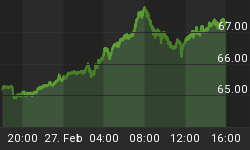Global foreign exchange reserves used to be largely held as US Dollars. However, the introduction of the Euro and growing fears of the United States' budget and trade deficits led central banks to diversify their foreign exchange reserves away from Dollars. Figures 1 and 2 illustrate that as a percentage of reserves, Euro holdings increased from 19% to 25% even before the present financial crisis, while dollars fell from 72% to 65% of total holdings by 2006. Given the growing US deficits, central banks had good reason to diversify their holdings, but because of the current sovereign problems in the Euro-zone, this may have been a wasted effort. Now, China and other central banks are confronted with finding alternatives to both the Dollar and the Euro. While gold has recently been falling as a side effect of a declining Euro, the Euro-zone problems aptly demonstrate why everyone (investors, central banks, and the general population) must diversify out of developed world currencies and into gold.
Figure 1. Total Foreign Exchange Holdings (in millions of U.S. Dollars)
![]() Larger Image
Larger Image
Source: IMF
Figure 2. Composition of Allocated Reserves
Source: IMF, Continental Capital Advisors, LLC
The concentration of reserves in questionable currencies suggests that central banks will be faced with continuing challenges, but no nation's course of action will be more influential than that of China's. China is currently faced with two dilemmas regarding its foreign exchange reserves. First, China needs to invest the new Dollars and Euros it receives from its trade surplus with America and the Euro-zone, and secondly, China will have to make crucial decisions about the composition of its existing $2.4 trillion of reserves. Thus far, China has begun this process by converting a portion of its new trade Dollars into Euros and commodities. However, given the problems in the Euro-zone, that strategy will likely need to be revised. For example, Yu Yongding, a former adviser to the Chinese Central Bank, said that China should not buy a "large chunk" of Greek government debt because the securities are more risky than U.S. Treasuries. So far, China has done little to diversify its existing reserves and because the universe of freely trading currencies outside of Dollars, Euros, Yen and Pounds is relatively small, China (and other central banks) must allow its currency to appreciate while continuing to diversify into resources and gold. However, with markets quickly understanding the fiscal problems of the US and Europe, the window of opportunity to execute this strategy is rapidly closing.















